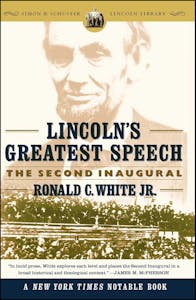After four years of unspeakable horror and sacrifice on both sides, the Civil War was about to end. On March 4, 1865, at his Second Inaugural, President Lincoln did not offer the North the victory speech it yearned for, nor did he blame the South solely for the sin of slavery. Calling the whole nation to account, Lincoln offered a moral framework for peace and reconciliation. The speech was greeted with indifference, misunderstanding, and hostility by many in the Union. But it was a great work, the victorious culmination of Lincoln's own lifelong struggle with the issue of slavery, and he well understood it to be his most profound speech. Eventually this "with malice toward none" address would be accepted and revered as one of the greatest in the nation's history.
In 703 words, delivered slowly, Lincoln transformed the meaning of the suffering brought about by the Civil War. He offered reunification, not revenge. Among those present were black soldiers and confederate deserters, ordinary citizens from all over, the black leader Frederick Douglass, the Cabinet, and other notables. John Wilkes Booth is visible in the crowd behind the president as he addresses posterity.
Ronald C. White's compelling description of Lincoln's articulation of the nation's struggle and of the suffering of all -- North, South, soldier, slave -- offers new insight into Lincoln's own hard-won victory over doubt, and his promise of redemption and hope. White demonstrates with authority and passion how these words, delivered only weeks before his assassination, were the culmination of Lincoln's moral and rhetorical genius.
